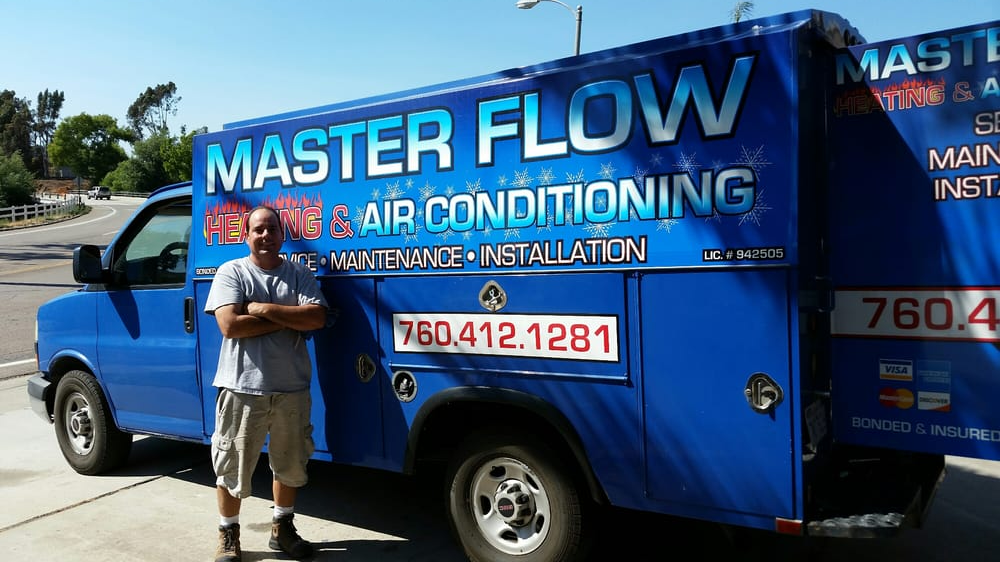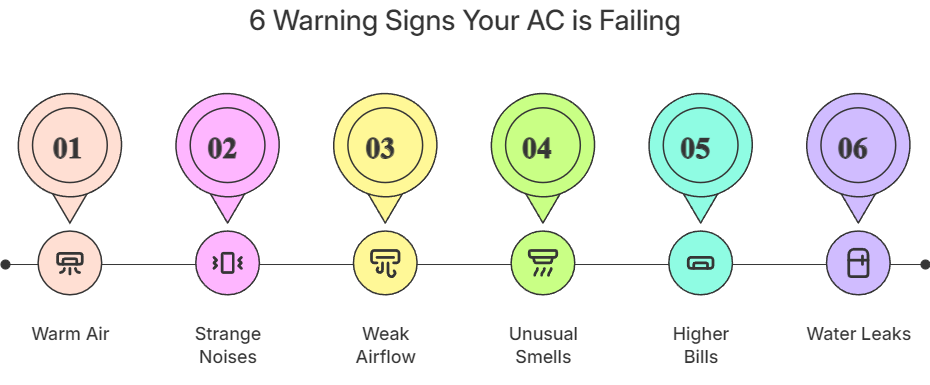AC Repair Fallbrook: Signs Your Air Conditioner Needs Immediate Repair

How to Tell if Your AC Needs Repair (Before It Completely Breaks Down)

1. Warm Air Coming from the Vents
If you notice that the air coming out of your vents feels warm instead of cool, even though the thermostat is set correctly, this is a clear warning. Possible causes include low refrigerant levels or a failing compressor. Either way, it is not something you should ignore. Calling a technician early can prevent a total breakdown.
2. Strange Noises While the AC is Running
A properly functioning AC unit should operate quietly in the background. If you start hearing banging, screeching, buzzing, or grinding sounds, it usually points to internal mechanical problems. Unusual noises are your AC's way of telling you that something is loose, worn out, or close to failing.
3. Weak or Reduced Airflow
When the air from your vents feels weak, even though the system is running, it could mean several things:
- A clogged air filter
- Ductwork problems
- A failing blower motor
Reduced airflow not only makes your home less comfortable but also forces your system to work harder, which can lead to larger repairs if left unchecked.
4. Unpleasant or Unusual Smells
Your AC should not produce any noticeable smell. If you detect a musty odor, it may indicate mold growth inside the ductwork or unit. A burning smell could suggest serious electrical issues. In either case, you should turn off your system and have it inspected immediately.
5. A Sudden Increase in Your Energy Bills
If your energy usage has not changed but your bill suddenly jumps, it often signals that your AC is working harder than it should. When systems become inefficient due to underlying issues, they use more energy to achieve the same level of cooling.
6. Water Leaks Around the Unit
A small amount of condensation is normal, but visible puddles or leaking water around your indoor unit are not. Water leaks often point to blocked condensate drains or refrigerant problems, both of which require professional attention.
Quick Table: Common AC Problems and How to Respond
| Problem | Likely Cause | Urgency | What You Should Do |
|---|---|---|---|
| Warm air from vents | Refrigerant leak or compressor issue | Critical | Call an HVAC technician immediately |
| Strange noises during operation | Mechanical or motor problems | High | Shut off the unit and schedule a repair |
| Weak airflow | Blocked filters, bad ducts, or blower issues | Moderate | Book a system inspection |
| Musty or burning smells | Mold growth or electrical problems | Emergency | Stop using the unit and call for help |
| Spiking energy bills | System overworking due to hidden issues | Moderate | Schedule maintenance |
| Water leaks around the unit | Blocked drain lines or refrigerant leak | High | Arrange for emergency service |
Frequently Asked Questions (FAQ)
How often should I have my AC system serviced in Fallbrook?
It’s recommended to have a full inspection and service at least once a year, ideally during the spring, before the intense summer heat sets in.
Is it dangerous to keep using my AC if it's making loud or strange noises?
Yes, it is risky. Continuing to operate a failing unit can cause minor mechanical issues to worsen, leading to higher repair costs—or even full system replacement.
What does a typical AC repair cost in Fallbrook?
Depending on the issue, you can expect to pay between $150 and $600 for standard repairs. Minor issues caught early are usually far cheaper to fix.
Can I repair minor AC problems myself?
Simple tasks like changing air filters or clearing debris around your outdoor unit are safe for most homeowners. However, repairs involving electrical components, refrigerant, or internal parts should always be left to licensed HVAC professionals.
What does it mean if my AC smells bad?
A musty smell typically points to mold buildup, while a burning smell could indicate electrical hazards. Both situations require immediate professional inspection to avoid health risks and further damage.
can emphasize this text with bullets, italics or bold, and add links.
Pro Tips: How to Keep Your AC in Great Shape
- Schedule maintenance early: Book a tune-up in the spring when technicians are more available and prices are often lower.
- Pay attention to changes: If you hear, smell, or feel something unusual, address it quickly instead of hoping it resolves itself.
- Stay proactive: Create a simple monthly checklist—listen to the unit, check the airflow, inspect for leaks, and make sure the thermostat is functioning properly.
Small steps can extend your system’s life and save you hundreds (or eve








